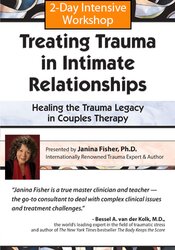

Even the most experienced therapist can be challenged when it comes to couples who are always at each other’s throats or in constant crisis! What do these couples have in common? They come with an unacknowledged legacy of childhood trauma or neglect.
Early childhood trauma has lasting and dramatic effects on attachment formation and on the later capacity for intimacy and mutuality. Instead of experiencing relationship as a haven of safety, traumatized couples are driven by powerful wishes and fears of closeness.
The enemy is not each other but the trauma.
In this transformational certificate recording, learn from master clinician and trauma expert Janina Fisher, PhD. She will provide in-depth training on the impact of early neglect, attachment failure, and childhood trauma on couple relationships. Janina will help you master a variety of new approaches and methods that can transform your work with your most challenging couples. You’ll learn:
Through Janina’s expert insightful commentary, in-session videos of couples, case studies and examples, you’ll develop highly practical, evidence-based skills, and learn powerful assessment tools, case conceptualization techniques and proven clinical strategies that you can immediately apply in your practice.
This online program is worth 11.5 hours CPD.
| File type | File name | Number of pages | |
|---|---|---|---|
| Manual - Treating Trauma in Intimate Relationships (6.3 MB) | 47 Pages | Available after Purchase |

Janina Fisher, PhD, is a licensed clinical psychologist and former instructor at The Trauma Center, a research and treatment center founded by Bessel van der Kolk. Known as an expert on the treatment of trauma, Dr. Fisher has also been treating individuals, couples, and families since 1980.
She is past president of the New England Society for the Treatment of Trauma and Dissociation, an EMDR International Association Credit Provider, Assistant Educational Director of the Sensorimotor Psychotherapy Institute, and a former Instructor, at Harvard Medical School. Dr. Fisher lectures and teaches nationally and internationally on topics related to the integration of the neurobiological research and newer trauma treatment paradigms into traditional therapeutic modalities.
She is co-author with Pat Ogden of Sensorimotor Psychotherapy: Interventions for Attachment and Trauma (2015) and author of Healing the Fragmented Selves of Trauma Survivors: Overcoming Internal Self-Alienation (2017) and the forthcoming book, Working with the Neurobiological Legacy of Trauma (in press).
Speaker Disclosures:
Day 1 Program
The Effects of Early Relational Trauma: Emotional, Physiological, Relational
Day 2 Program
Shift from “Processing” Issues to Changing Patterns of Response
Satisfaction Guarantee
Your satisfaction is our goal and our guarantee. Concerns should be addressed to info@pesi.co.uk or call 01235847393.
Please wait ...